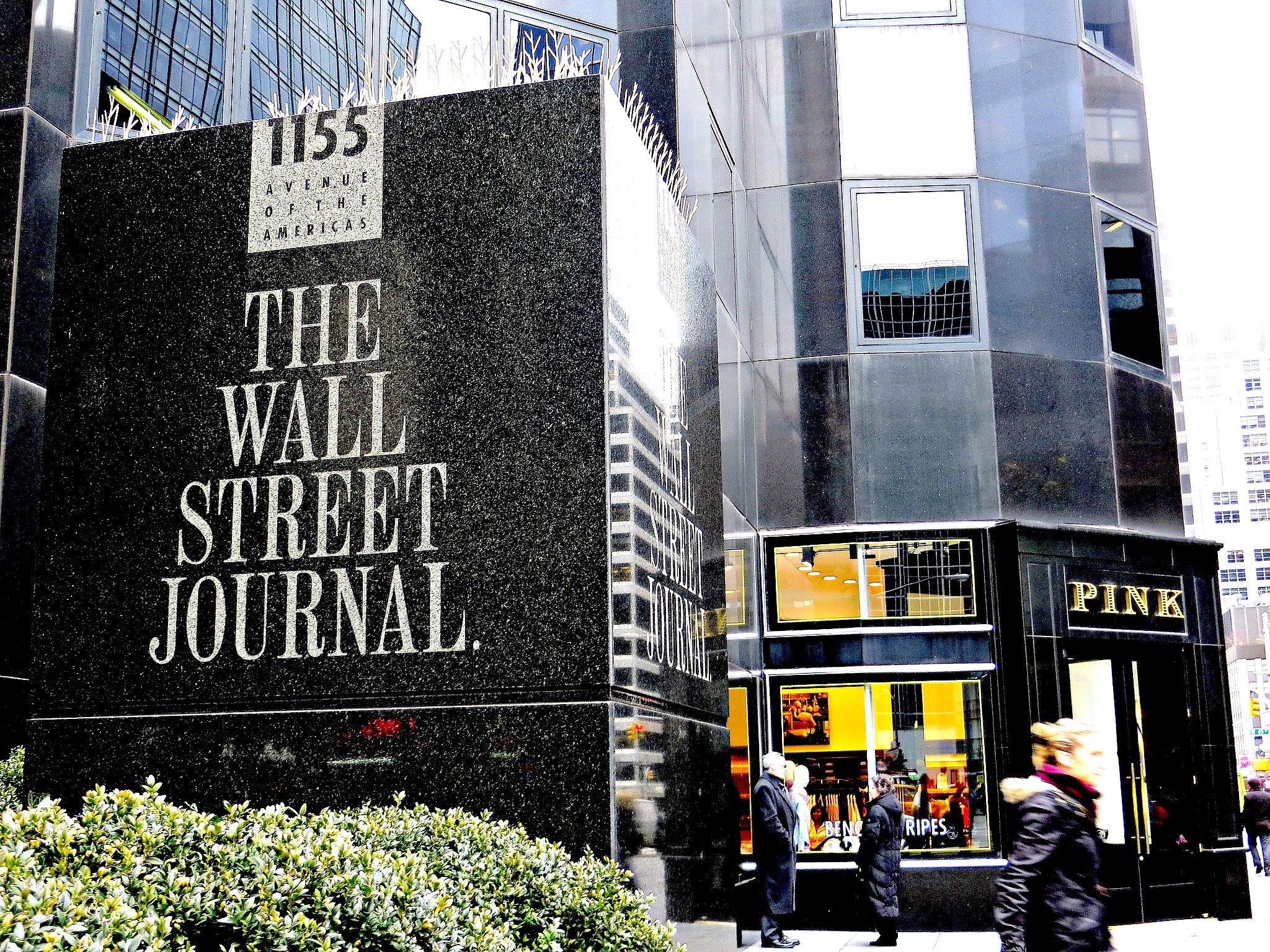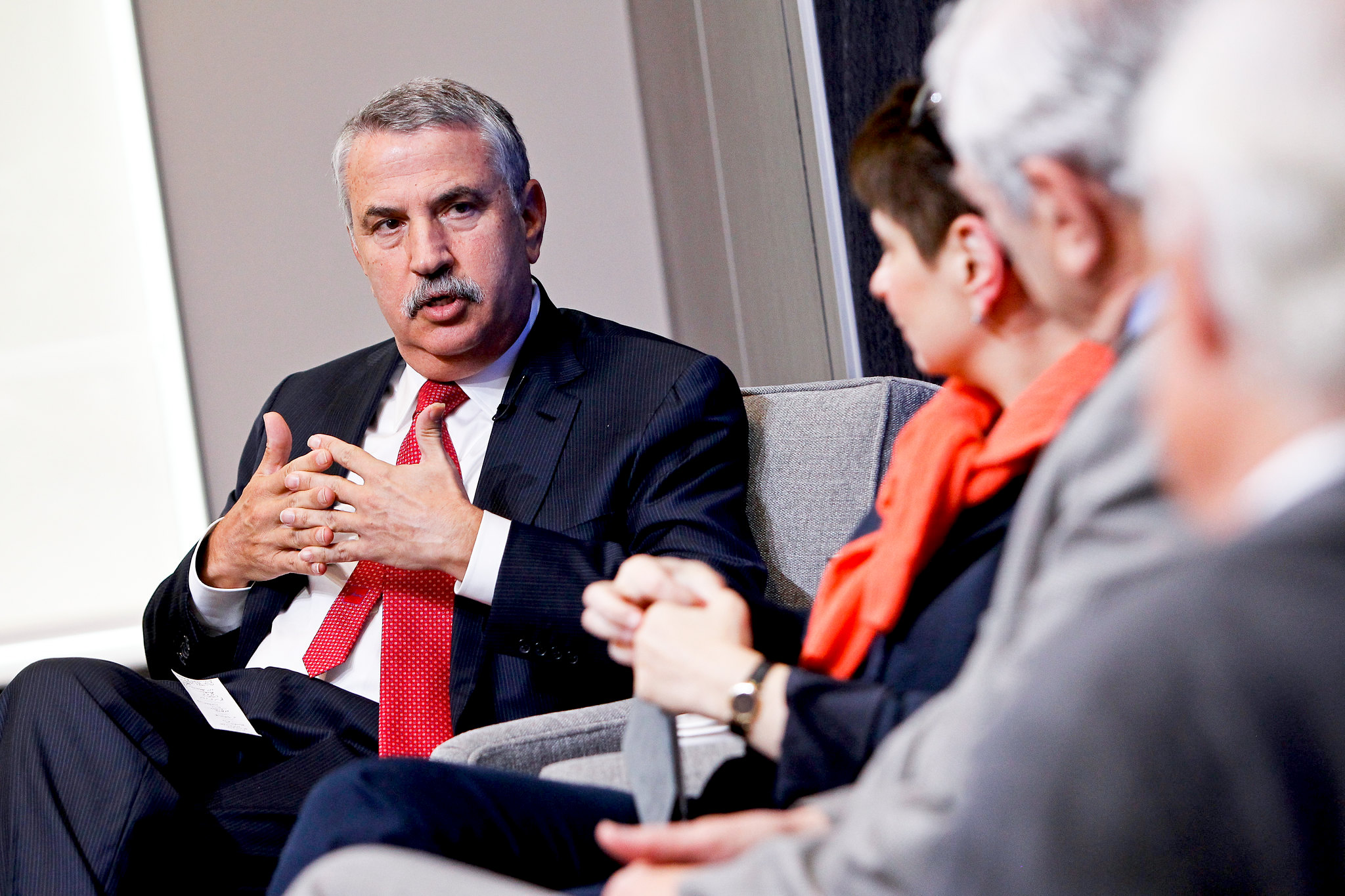Columns by Steven Stalinsky in The Wall Street Journal and Thomas Friedman in The New York Times offer case studies of unethical journalism, write Mischa Geracoulis and Heidi Boghosian.

Wall Street Journal headquarters in New York. (John Wisniewski, Flickr, C BY-ND 2.0)
By Mischa Geracoulis and Heidi Boghosian
Special to Consortium News

 Editorials and op-eds often have a greater influence on public consciousness than news articles because they can express authoritative opinion, provide in-depth analysis and advocate for specific viewpoints.
Editorials and op-eds often have a greater influence on public consciousness than news articles because they can express authoritative opinion, provide in-depth analysis and advocate for specific viewpoints.
Emotional appeals and rhetoric have the potential to engage readers on a deeper level and to shape public opinion more effectively.
When irresponsibly written, however, echoing government propaganda or lacking a basis in fact, opinion pieces can turn from a public service to a detriment to democracy.
On Feb. 2, The Wall Street Journal published an opinion piece by Steven Stalinsky, titled “Welcome to Dearborn, America’s Jihad Capital.” The headline sums up Stalinsky’s intent to portray Dearborn, Michigan, as a hotbed of terrorism.
He lazily digs up old 9/11-era messaging from the Justice and State departments that claimed Dearborn accommodated “possible sleeper cells.” Stalinsky goes on to quote social media messaging from unverified accounts on X (formerly Twitter) and Telegram, and concludes with an ominous admonition that “what’s happening in Dearborn…is potentially a national-security issue affecting all Americans.”
This is disgusting. @WSJ should be ashamed of itself for promoting this kind of Islamophobic BS, and should immediately apologize to the residents of Dearborn and to Muslims everywhere. Thank you @AHammoudMI for your leadership as Mayor. https://t.co/QmtLrG6M8a
— Rep. Pramila Jayapal (@RepJayapal) February 4, 2024
The Wall Street Journal’s editorial guidelines advise making a strong argument on an issue in the news. In the case of Stalinsky’s piece, presumably the “issue in the news” that he’s arguing is with Dearborn’s Mayor Abdullah Hammoud’s decision to not meet with President Joe Biden’s campaign manager, Julie Chavez Rodriguez, during Biden’s Feb. 1 trip to Michigan.
Instead of discussing electoral politics with campaigners, Hammoud asked for meaningful dialogue with senior policymakers who have the power to make decisions. Stalinsky asserts that “Dearborn’s radical politics are complicating Mr. Biden’s path to re-election” without providing a reasonable explanation for the remark. Is he suggesting that the mayor’s request for meaningful dialogue exemplifies “Dearborn’s radical politics?”
President Biden’s national campaign manager was sent to Michigan to meet with a group of Arab and Muslim American leaders on Friday. I was invited to attend.
— Abdullah H. Hammoud (@AHammoudMI) January 26, 2024
Scapegoating Dearborn is hardly novel. The city that’s home to the largest percentage of Arab Americans in the United States has long been an easy target for right-wing media that feed on fear, suspicion and divisiveness.
Spotlighted in a 2017 article for Truthout, as Sister City to Qana, Lebanon, Dearborn has welcomed immigrants from the Middle East, North Africa and Southwest Asia since the 1970s.
Protesters in Dearborn, Michigan, call for an immediate ceasefire and an end to Israeli aggression in #Gaza. pic.twitter.com/Mds8zWYZLj
— PALESTINE ONLINE ?? (@OnlinePalEng) January 28, 2024
Current census data, nevertheless, reveals Dearborn’s majority White, native-born population, and that Mexico is the most common birthplace of its foreign-born residents.
Stalinsky mentions “open support for Hamas” and that “protests have occurred in major American cities featuring pro-jihadist imagery, chants and slogans,” yet offers no facts to back that up. Asserting this within the context of his grievances with Dearborn implies that such protests were happening there during Biden’s campaign visit.
This is Dearborn, @WSJ. pic.twitter.com/ksARO7vsbv
— Abdullah H. Hammoud (@AHammoudMI) February 3, 2024
On Feb. 2, the same day of Stalinsky’s op-ed, Democracy Now! interviewed Mayor Hammoud and showed peaceful marches calling for a ceasefire. Equating Americans’ revered practice of engaging in protest with support for Hamas and terrorism does a grave disservice to the First Amendment.
Since Stalinsky’s op-ed, Dearborn has had to ramp up law enforcement protection at major infrastructure points around the city. Is this the potential national security issue that Stalinsky thinks Americans should be worried about?
Friedman’s Middle East ‘Animal Kingdom’
Also on Feb. 2, The New York Times published opinion writer Thomas L. Friedman’s “Understanding the Middle East through the Animal Kingdom.”
Friedman starts out by taking a guess that the “U.S. will probably retaliate against pro-Iranian forces and Iranian agents in the Middle East that Washington believes are responsible for the attack on a U.S. base in Jordan that killed three soldiers on Jan. 28.”
He follows with a list of other events that he imagines could happen in the coming week involving the Middle East. His preference, he says, is to think about these things by drawing parallels to nature.
In his imaginings, the Middle East is a “jungle.” He likens Iran to a “parasitoid wasp,” Lebanon, Yemen, Syria and Iraq are “caterpillars,” Houthis, Hezbollah, Hamas are “eggs that hatch inside the host,” but Hamas is also equated to a “trap-door spider.”

Friedman in 2015. (Brookings Institution, Flickr, CC BY-NC-ND 2.0)
Friedman analogizes Benyamin Netanyahu to a “sifaka lemur,” digresses into a clause about seeing one in Madagascar, before stating that lemur-like Netanyahu may need to make a decision in the week ahead.
According to The New York Times’ standards and ethics, their readers’ trust is essential and renewable every day through their actions and decisions in the media and public sphere.
The Times also claims to hold itself accountable to its strict standards and ethics guidelines. Former editor of the opinion pages, Andy Rosenthal, says that NYT editorial writers are highly experienced, most are former reporters, and each has a responsibility to their expertise.
Rosenthal explains in a video on how to write an editorial that a solid opinion piece should take a position that can be strongly and persuasively argued, is based on principles and facts, and should either propose a solution to a problem or defend a position. How does the Freidman piece meet any of those guidelines?
Neither the The Wall Street Journal nor the Times op-ed demonstrates thoughtful analysis, logical argumentation, or documentation of facts. They offer no substantive or moral value to the national discourse on Hamas and Israel.
Thomas Friedman: I’m having some really racist thoughts.
NYT: Great, let’s publish them. @nytimes pic.twitter.com/ZMyfSpn3yG— Adnan Ahmed (@adnanmsp) February 3, 2024
Instead, both illustrate the corporate media’s overt biases and provide excellent case studies of unethical journalism.
Opinion writing, arguably, is not journalism. However, in the case of these two writers — one the executive director of the Middle East Media Research Institute, and the other an author, reporter, and, regular columnist for The New York Times — their work should, at a minimum, adhere to the standards and ethics of their publications and to the Society of Professional Journalists’ Code of Ethics.
Although hateful, hurtful, and dehumanizing speech and writing may be protected by the First Amendment and Article 19 of the Universal Declaration of Human Rights, it breaks the journalistic ethics code of minimizing harm. Stalinsky and Friedman have chosen to compromise the standards of their publishers, and to prioritize incendiary writing over the public’s need for information.
Such opining is more irresponsible given Americans’ difficulty distinguishing fact from opinion. Journalism professor Kevin M. Lerner notes in The Conversation that news consumers do not always make the necessary distinction between what’s published in the “news” section versus “opinion.” As opinion blends into news, particularly when expressed by established reporters and experts, ideas around credibility are compromised.
Considering the already-blurred lines between legacy media and social media, journalistic gaffes do more than undermine the role and reputation of journalism in a democracy; they jeopardize democracy itself. The Pulitzer Prize-winning national newspapers of record bear greater responsibility than social media in this democratic project.
Heidi Boghosian is an attorney and is the executive director of the A.J. Muste Memorial Institute. Previously she was the executive director of the National Lawyers Guild. She wrote I Have Nothing to Hide and 20 Other Myths About Surveillance and Privacy (2021), and co-hosts the weekly civil liberties show Law and Disorder on Pacifica Radio’s WBAI in New York and broadcast on more than 120 stations.
Mischa Geracoulis is a media literacy expert, writer, and educator, serving as Project Censored’s curriculum development coordinator, and on the editorial boards of the Censored Press and The Markaz Review.
Views expressed in this article may or may not reflect those of Consortium News.

The supremacist tenets of Jewish ideology must be challenged and confronted, it’s not anti-Semitic to do so. Gilad Atzmon and Israel Shahak, among many other righteous Jews, are two Jews who have fought against Jewish supremacy for much of their lives.
The most important book on the planet right now, and it’s a relatively short read, is Israel Shahak’s “Jewish History, Jewish Religion.”
One simply cannot understand Zionist conduct or Tel Aviv’s behavior in the Middle East if one has failed to read this book. Cold calculating imperial interest is NOT necessarily the driving force behind sadistic Israel’s violence across the region. What is the driving force more often than not, is Jewish ideology, its supremacist and arrogant doctrines.
We must remember, plastered on the side of every Israeli fighter jet (thank you hardworking U.S. taxpayer) is one of the ultimate Jewish religious symbol, the Star of David.
The Jews were rescued from religious superstition too late! It happened in the late 1800s. Well into the late 1800s many, many Jews in Europe were involved in all sorts of irrational and crazy religious dogma and insanity.
The hatred of gentiles, which is an important component within the Talmud, is showing through today in Israel’s treatment of the Palestinians. Many Israeli Jews view us as dogs and livestock in order to extort as much interest from us as possible.
Don’t fool yourselves, these Jewish supremacist Zionists would bomb your hospital too if it furthered their cause.
Hard to believe…so many in awe of the USofA. Ignorance? Indifference? Blind? Deaf?
The US is surely of the worst informed and deluded populations with “perception management” and “control of what everyone thinks” underway for so many decades but even so more than 70% in the US think the country is on the wrong track and half do not support obliterating the Palestinians. World-wide the US is isolated amongst a group of lackeys with the majority of countries appalled and the horror growing every day. Dung-beetle journalism (thanks firstpersoninfinite in comment below) is not working all that well. Perhaps there is an extreme of cruelty and stupidity we have now reached?
Stalinsky and Friedman are both boot-licking pieces of human garbage. May they rot in a personal hell of their own making for the perpetual lies and propaganda they so happily spread among the world, which only goes to serve the most heinous of agendas.
Both the Wall Street Journal and the New York Times stopped engaging in “journalism” decades ago. Both today are simply newsletters and public relations arms for the neoliberal and neocon establishment. But that is the case for all mainstream media today. Two hedge funds, BlackRock Fund Advisors and Vanguard Group, are the ultimate owners of both Fox News Corp. and Comcast, which means they are the ultimate boss of both Rachel Maddow and Sean Hannity! Together, BlackRock and Vanguard own 18% of Fox, 16% of CBS, 12% of CNN, 12% of Disney, 15% of Comcast (which owns NBC, MSNBC, CNBC, and the Sky media group), 12% of CNN, 15% of Gannett (whose newspaper holdings include USA Today), 10% of Sinclair, and an indeterminate percentage of Graham Media Group, which owns Slate and Foreign Policy.
ALL of these outfits are lying all the time, without exception, in service of the interests of the half dozen megacorporations that own them all — the smallest number of media companies are now reaching the largest number of people in U.S. history. That means the same pro-corporate message is being pounded into our heads unceasingly, 24/7.
“The science of modern propaganda has been in research and development for more than a century now, and has necessarily advanced scientifically just as much as other fields in the military have. Propaganda only works if you don’t understand (A) that it is happening to you and (B) how it is occurring. A basic awareness of the fact that there’s a globe-spanning campaign to manipulate human thought to the advantage of the powerful is the first step toward having that understanding. Having the humility to understand that you yourself can be manipulated and deceived is the second step.” — Caitlin Johnstone
So – cancel any and all subscriptions to the NYT and the WSJ … hit ’em in the pocketbook, the rear end of all these corp animals …
It is advertisers, not subscribers, that are the main sources of income for the corporate media. That anyone who regards themselves as on the Left pays for a subscription to the corporate media is bizarre.
I guess the only question that remains is how low will these empire apologists go? This is what unchallenged power produces. The worst of the worst of humanity. And they dare raise themselves above the victims of this blood thirsty system.
Coincidence that both similar-in-messaging pieces showed up *coincidentally,* from two entities within hailing distance of each other, consecutively, on the same day in two such prominent papers?
It is the age of the ongoing and hyper-refined psy-op, the age of full-spectrum asymmetric warfare, with propaganda reigning paramount, and I have no choice but to rationally conclude sometimes a coincidence is more than a coincidence. And this appears to be one such in shaping feelings enmasse, hardening them and their outcomes’ subsequent views by attenuating fear and anger interchangeably.
The arrogance—aimed at the aggrieved parties specifically—and the condescending insult to the intelligence of the public-at-large, looms large as to this twinned incident being purposed and purposeful.
How low will they go? I think the sentient among us can answer that, but only articulate if it serves a higher purpose, as most are yet unwilling or unable to cut through the cognitive dissonance regarding those who would and do try to direct our perceptions and turn them into actions or further apathetic inactions. For this field is full of land mines.
Agreed!
Animal Farm by George Orwell! Maybe with Netanyahu as Napoleon ?
Stalinsky: Son of Stalin?
Coincidentally, I’m currently drinking coffee from Qamaria Yemeni Coffee Company, Dearborn, MI
Russell, Keaton, and Kurt had a field day with Friedman’s absurd “article” over at the Jimmy Dore show. At one point, Russell was laughing so hard he almost blew a fuse. One of the best defense tactics with the sociopaths is to genuinely laugh at them. Check it out:
HE’S BUGGING OUT!
Wait, let me give the methods of these two so-called “journalists” and “intellectuals” a try: anyone named Stalinsky is obviously a Russian plant working for Putin under an assumed name, trying to undermine democracy in America and finally win the Cold War post facto, just as the Confederacy tried to win the Civil War after the fact with Jim Crow and segregation laws in the 20th century. As for Friedman, describing current political reality with animal names for those involved can only mean that he sees himself as an animal also, or else Friedman is worshipfully echoing the use of similar names against Palestinians by higher-ups in the Israeli government. In either case, Friedman’s name would be dung beetle, a creature building arguments for global capitalism from the excrescences left behind by its worst, and least necessary, actions.
Anyone who believes anything the mainstream media has to say is BRAIN DEAD!
The legacy mainstream media died in the US with the “modernization” of our anti-domestic propaganda Smith Mundt Act, followed by the Countering Foreign Propaganda and Disinformation Act of 2016. Now we have State Media which would make Goebbels proud, Official Narratives LEGALLY controlled by the State Dept/ CIA and disseminated by corporate legacy media in partnership with the federal government.
Totalitarian states are so much more efficient than REAL democracies. Their incompetence and alternative media are all that allows real information to slip past the censors. For now.